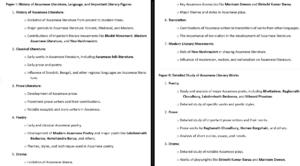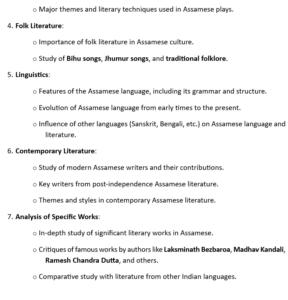Table of Contents
Assamese is one of India’s 22 official languages with a rich literary tradition. In the Mains exam, candidates must take two papers on their chosen optional subject. In the UPSC Civil Services Exam, candidates who are proficient in Assamese can choose it as an optional subject. Paper I covers the history, evolution, and important literary movements in Assamese literature. Paper II focuses on the in-depth study and analysis of important Assamese works in prose, poetry, and drama.
UPSC Assamese Literature Syllabus Overview
The UPSC has released a notification for the 2025 session with all the details regarding Assamese Literature syllabus. Assamese is one of the 28 optional literature subjects in the UPSC exam. It is a good choice for candidates who have studied it in school or are fluent in the language.
| UPSC Assamese Literature Syllabus 2025 Overview | |
| Name of Conducting Body | Union Public Service Commission (UPSC) |
| Mode Of Exam | paper pen (offline mode) based examination |
| Botany Optional Subject | Paper I & II |
| Total Marks | 250 Marks for Each (Paper I & II) |
| Total Time | 3 Hours Each |
| Language of Question Paper | English and Hindi only |
| Official Website | upsc.gov.in |
UPSC Assamese Literature Syllabus for Optional ( Paper I)
The first paper of the UPSC Assamese Literature Syllabus covers topics including Language, Literary Criticism, and Literary History. The complete syllabus for Paper I is provided in the table below.
| UPSC Assamese Literature Optional Syllabus ( Paper I) | |
|
Language
|
History of the origin and development of the Assamese language- its position among the Indo-Aryan language- periods in its history
|
| Development of Assamese prose | |
|
Vowels and consonants of the Assamese language- Rules of phonetic changes with stress on Assamese coming down from old Indo-Aryan
|
|
| Assamese vocabulary- and its sources | |
|
Morphology of language- conjugation- enclitic definitive and pleonastic suffixes
|
|
|
Dialectical divergences- the standard colloquial and Kamrupi dialect in particular
|
|
|
Assamese script- its evolution through the ages till the 19th century A.D.
|
|
|
Literary Criticism and Literary History
|
Principles of literary criticism up to new criticism |
| Different literary genres | |
| Development of literary forms in Assamese | |
| Development of literary criticism in Assamese | |
|
Periods of the literary history of Assam from the earliest beginnings
|
|
Download PDF: UPSC Assamese Literature Syllabus PDF
UPSC Assamese Literature Syllabus for Optional ( Paper II)
UPSC Assamese Literature Syllabus: The Assamese Literature Syllabus for UPSC Paper II is categorized into 2 parts. The detailed list of topics is in the table below for a detailed syllabus.
| UPSC Assamese Literature Optional Syllabus ( Paper II) | |
|
Part A
|
Râmâyana (Ayodhyâ Kânda)—by Madhava Kandali |
| Pârijât-Harana —by Sankaradeva. | |
| Râsakrîdâ —by Sankaradeva (From Kirtana Ghosa) | |
| Bârgeet —by Madhavadeva | |
| Râjasûya —by Madhavadeva | |
| Kathâ-Bhâgavata(Books I and II) —by Baikuntha Nath Bhattacharyya. | |
| Gurucharitra-Kathâ (Sankara deva’s Part only) —ed. by Maheswar Neog | |
|
Part B
|
Mor Jeevan Soñwaran —by Lakshminath Bezbaroa |
| Kripâbar BorbaruârKakatar Topola —by Lakshminath Bezbaroa. | |
| Pratimâ —by Chandra Kumar Agarwalla. | |
| Gâonburhâ —by Padmanath Gohain Barua | |
| Manomatî —by Rajanikanta Bordoloi | |
| Purani Asamîyâ Sâhitya —by Banikanta Kakati | |
| Kârengar Ligirî —by Jyotiprasad Agarwalla | |
| Jeevanar Bâtat —by Bina Barva(BirinchiKumar Barua) | |
| Mrityunjoy —by Birendrakumar Bhattacharyya | |
| Samrât —by Navakanta Barua | |
UPSC Assamese Literature Exam Pattern
Each paper in the UPSC Assamese Literature exam is of 250 marks, making a total of 500 marks. Scoring well is important for overall performance. Understanding the syllabus is the first step to success in this subject. Candidates with a background in Assamese Literature (undergraduate or master’s) may find the syllabus familiar. The exam consists of two papers, each of 3 hours.
| UPSC Assamese Literature 2025 Exam Pattern |
||
| Topic | Marks | Duration |
| UPSC Assamese Literature Optional Syllabus Paper 1 | 250 | 3 Hours |
| UPSC Assamese Literature Optional Syllabus Paper 2 | 250 | |
| Total Marks | 500 | |
UPSC Assamese Literature Preparation Strategy
To ensure a favorable result in UPSC, candidates preparing for the exam should start their preparations now as the UPSC syllabus has been released. Before appearing for the exam, it is important to develop an effective study plan. Here are some useful tips to consider:
- Familiarize yourself with the UPSC Assamese literature syllabus and thoroughly understand the exam pattern.
- To understand the Assamese literature syllabus better, focus on the historical development of literary works. This will help you grasp the content more quickly.
- The syllabus covers a lot of literature and prose, so study each piece carefully, paying attention to key chapters and phrases. Use online study materials and refer to previous year’s UPSC question papers and mock tests to strengthen your preparation.
- Revision plays a important role in exam preparation. Candidates should allocate time to revise all important and weak topics just before the Preliminary and main exams. This last-minute revision will aid in recalling the topics effectively. During the UPSC revision test series, prioritize strengthening your stronger areas instead of focusing excessively on weaker sections, as addressing weak areas at the last moment can create unnecessary stress.
| Relatable Articles | |
| UPSC Geography Syllabus | UPSC Agriculture Syllabus |
| UPSC Animal Husbandry and Veterinary Science Syllabus | UPSC Botany Syllabus |





 TSPSC Group 1 Question Paper 2024, Downl...
TSPSC Group 1 Question Paper 2024, Downl...
 TSPSC Group 1 Answer key 2024 Out, Downl...
TSPSC Group 1 Answer key 2024 Out, Downl...
 UPSC Prelims 2024 Question Paper, Downlo...
UPSC Prelims 2024 Question Paper, Downlo...




